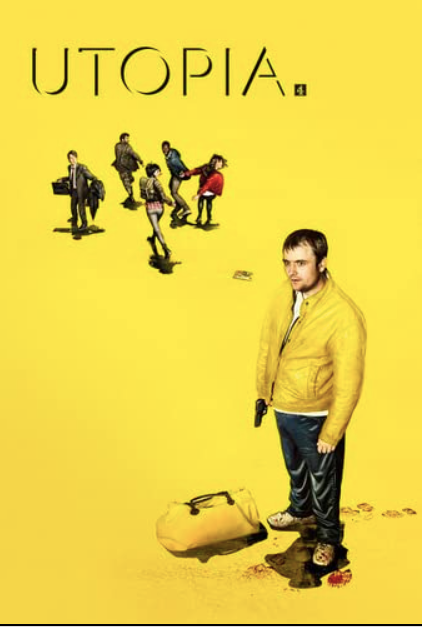
I watched and reviewed the American version of Utopia -- the one season -- two years ago. I thought it had its moments, was right for the occasion of the Covid pandemic, but also had several things I didn't like. Now, two years later, I barely remember it. Indeed, I wasn't thinking about it all until a friend, Mike Grynbaum, urged me to watch the 2013-2014 two-season British version. He said the 2020 American version was terrible, but the British version was right up my alley.
He was right. I thought the British version was superb on all kinds of levels. And now that I've seen it, I think even less of the American version.
[Mild spoilers ahead ...]
The central theme of the tautly, harrowingly drawn British Utopia, that a group of scientists and government officials are putting into motion a plan to drastically prune the human species, is itself chilling. But the specifics of their plan, to render 90% of human beings infertile. via a DNA mix distributed with a vaccine for a "Russian flu" that was itself a hoax -- well, that was truly downright frightening, especially because it was all too reminiscent of what some insane conspiracy theorists have been saying about the mRNA vaccines distributed to lessen the severity of the real and very lethal COVID-19 pandemic we're still attempting to tamp down to reliable manageable levels. In fact, I couldn't help wonder, as I watched this series with something akin to horror, if some of the conspiracy theorists in our real world had been consciously or unconsciously influenced in their views about COVID-19 vaccines by what they may have seen in the British Utopia.
And the logic behind this plan was top-notch science fiction struggling with ethical conundrums. The world is overpopulated. One way of dealing with that is severely limiting reproduction. That would be a remedy I wouldn't choose in a million years -- I would prefer figuring out better ways to live on Earth without plundering the planet, combined with getting off of Earth to other habitable planets (see my The Missing Orientation) -- but the suggestion has just enough plausibility that you can believe, as a viewer, that some half-crazed scientist and ruthless government officials might go for it.
Even more important for the narrative, that one of the good guys, physically attacked by purveyors of the plan, changes allegiances and works on behalf of the plan. Indeed, one of the other great strengths of this story is not only how a hero becomes a villain, but how a villain becomes a hero, against the backdrop of a vast array of vivid, idiosyncratic, and therefore memorable characters who are intractably working for the good, bad, and everything in between.
If there was one thing I didn't care for in the British Utopia it was its partaking of the trauma porn which has become a veritable hallmark of fantasy and science fiction since 2013-2014, ranging from House of the Dragon to The Peripheral, and even reaching as far as fiction verging on biopics such as Blonde. The spoon and the eye -- you'll of course know what I mean if you've seen British Utopia -- were revolting to see, and not really necessary to see in such detail.
But that shouldn't get in the way of your seeing Utopia the way the series was meant to be seen -- and now that I've alerted you to the brutality, you can safely turn away from the screen for a few moments when you see that spoon coming.
As I said at the beginning of this review, I've all but forgotten the 2020 American version.
In contrast, the 2013-2014 British version is something I'll never forget.

No comments:
Post a Comment